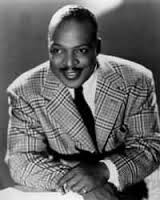Get Today in Masonic History into your Inbox. Sign up today for one of our email lists!
Need an article for your Trestleboard/Newsletter see our Use Policy
William James "Count" Basie is Born

Today in Masonic History William James "Count" Basie is born in 1904.
William James "Count" Basie was an American jazz musician.
Basie was born in Red Bank, New Jersey on August 21st, 1904. Basie got his musical talents from his parents who were both musicians, though not professionally. Basie's mother gave him his first piano lesson and paid 25 cents a lesson for all his future piano lessons. Basie was not much of a student and dreamed of traveling the World. He was inspired by the traveling circuses coming through town. He honed his skills as a musician by working at a local theatre and putting music to the acts and the silent movies. Although Basie was skilled with the piano he preferred the drums only going back to the piano when another boy in town, Sonny Greer, was more skilled than Basie was with the drums. While still in Red Bank he hung out the local pool hall where the other musicians were so he could hear the gossip and get a line on new gigs. He was mostly playing with pick-up groups before he left Red Bank.
At the age of 16, Basie headed to Harlem. Shortly after arriving he ran into Greer. Greer started introducing Basie to all the jazz, although it was not officially called jazz yet, musicians in Harlem. Most notably Basie was introduced to Duke Ellington, Greer was at the playing in one of Ellington's early bands.
During the rest of the 1920's Basie was in and out of Harlem. He was playing shows under the Theatre Owners Bookers Association (T.O.B.A.). Around 1928, Basie started playing with the Blue Devils in Texas and Oklahoma. The Blue Devils were one of the early jazz bands of the time. While Basie was playing with the Blue Devils he started to be known as "Count" Basie, making him jazz royalty. The term jazz royalty applies to those who have set themselves apart from the rest of the jazz community. Nicknames like Count, Duke and King were common.
Starting in 1929, Basie was playing with bands out of Kansas City, Missouri. Here Basie was mostly playing what was later known as swing music. In Kansas City, Missouri Basie married his first wife. The marriage only lasted until 1935 when the couple divorced.
In 1936, Basie and his band headed to Chicago. There Basie and his band worked with John Hammond, a producer and civil rights activist. Basie and his band had a recording session with Hammond, of which Hammond said, "the only perfect, completely perfect recording session I've ever had anything to do with."
In 1937, Basie took the band to New York City where they received a tepid reception at best. Hammond encouraged the band to keep pushing forward introducing Basie to Billie Holiday who sang with the band. In 1938, Basie and the band played the Savoy where the "battle of the bands" took place. Basie's band played with Billie Holiday singing and Chick Webb's group battled with them with Ella Fitzgerald on vocals. Basie's band came out on top and the big band battle gave them a recognition boost. Not long after, Benny Goodman's orchestra recorded Basie's signature piece "One O'Clock Jump."
During World War II the publics desire for big band music and swing music waned. Basie was not immune to this, although during the war he got gigs playing on Armed Forces Radio.
In 1950, Basie married his second wife, the couple remained together for the rest of their lives. Also in the 1950's Basie started touring Europe. Many jazz musicians worked their way around Europe where jazz and swing music were still very popular. Basie's band made two tours of the British Isles and had a command performance with Queen Elizabeth II. Another reason many musicians worked in Europe in the 1950's was to avoid the unrest due to the Civil Rights movement going on in the United States.
In 1961, Basie played one of the 5 inaugural balls for John F. Kennedy. Through out the 60's Basie and his band played around the country including Las Vegas.
In 1974, Basie appeared as himself in the Mel Brooks film Blazing Saddles.
Basie passed away in Hollywood City, Florida from pancreatic cancer on April 24th, 1984. He passed away just one year after his wife.
Basie was a member of Wisdom Lodge No. 102 in Chicago, Illinois.
This article provided by Brother Eric C. Steele.

